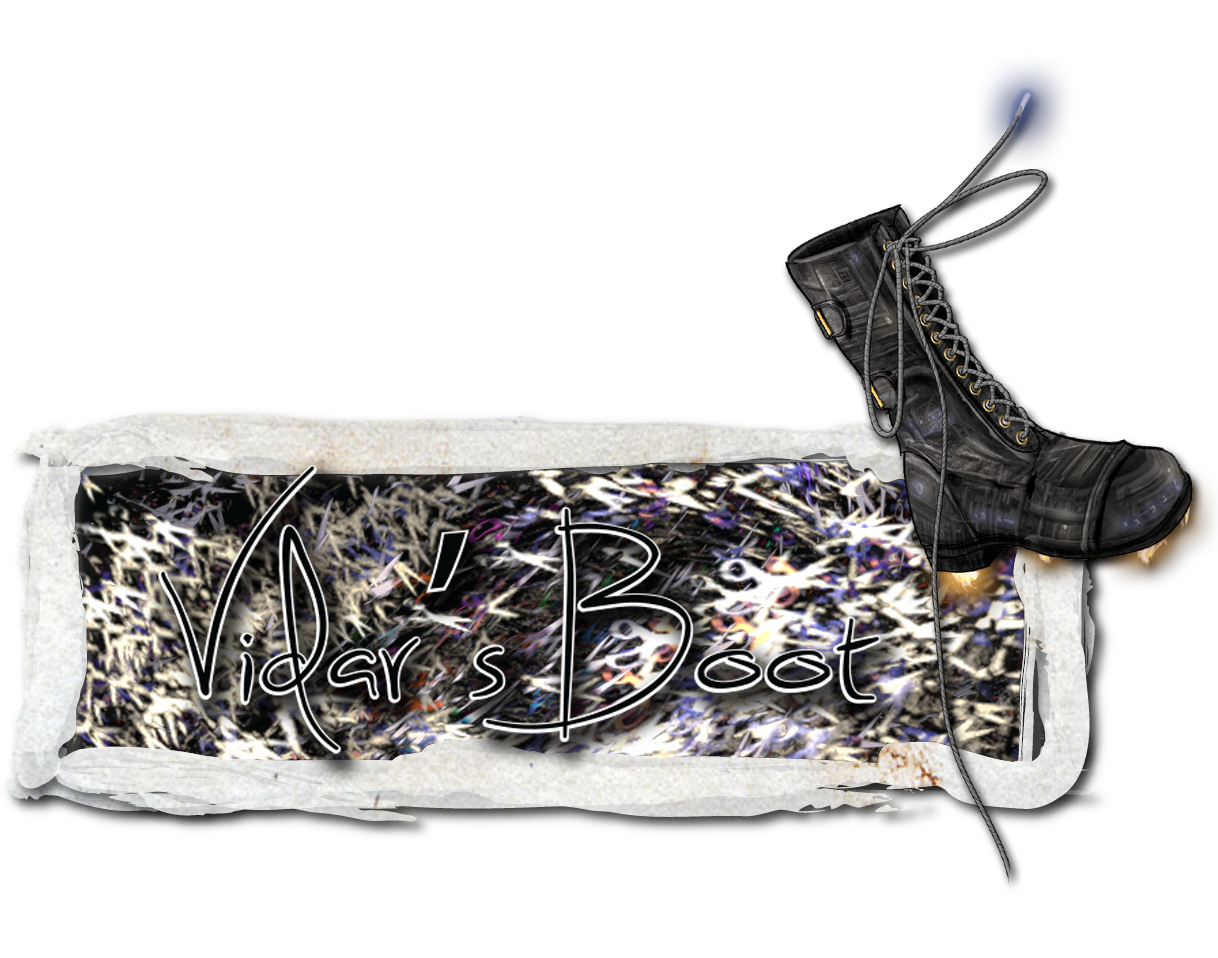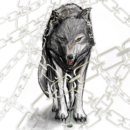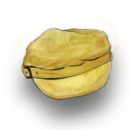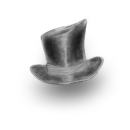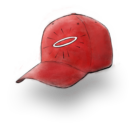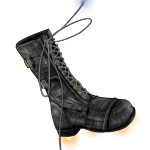– 1 –
“If I were a goat, ” Martin says, and he reaches skywards. He looks up. “I’d cut you, God. I’d slice you raw. I’d peel apart the endless hungry void.”
“Goats don’t do that,” observes Jane.
She’s his sister. Well, his adoptive sister. Well, the girl he found in the pantry. Really, there is no good way to summarize their relationship.
She’s sitting on a stool, drinking milk through a straw.
“Some goats might’n,” Martin argues. He doesn’t clarify what the ’n is an abbreviation for so we are going to have to assume it stands for “navigate starships.”
“If I were a goat,” Jane says thoughtfully, gesturing to denote a grand vision, “I would eat nothing but fruit cake and daisies.”
Martin squints at her through his Martin-goggles. “You have a fanciful notion of goats.”
– 2 –
Edmund attempts to meditate.
Hunger seethes in him like a stormy sea.
He touches it. He tastes it. He wraps himself around it and he hunts in svart-space, in the ethereal realm of concepts, for the weak point in the cord that holds the wolf.
He is making progress.
Thoughts are constellating themselves in his mind. Patterns are forming. Intentions, structures —
He twitches.
It occurs to him that possibly there is a group of students in yellow hats standing around him in a creepy circle, staring at him. He dismisses the notion. He has heard nothing, after all. His eyes are closed. There is no reason to think something like that might be there.
He tries to go back to meditation.
He is distracted further by knowing that he could check. He could just open his eyes, and look, and then close his eyes again, and then he would know that they’re not there, and he could stop worrying about it. Or they might actually be there, and then he’d know that too.
He opens his eyes. They are, of course, not there.
The very notion is ridiculous!
His doors are locked!
He closes his eyes again. He tries to get back to his meditation. It takes him forever to find the same detached state of mind he’d been in before. He realizes that he’d been lying to himself when he’d pretended that it would be so simple; that all he’d have to do is open his eyes, and close them again, and everything would be fine.
He realizes that that thought wasn’t reason or knowledge, just a part of his mind that had wanted to check so very badly that it had lied to the rest of his thoughts.
Still, he is almost —
He twitches.
He denies it. They were not there the last time so they must not be here this time. He has not seen them. He has not heard them. They are not there.
He smells something. It is probably just someone in the halls.
He has almost seen the structure of Fenris’ chains —
Has almost seen them twining there together in the nothingness: the footfalls of his cat, Inedible; the slowly drying spittle of some bird; the arms of a four-armed ape, most likely Eugenie’s; the torment of the willing, that he suspects is Sid’s; “the bearing witness to the wrongness,” on which he has not yet found a way to focus, quite; and how they all wind together around the gaping red-rimmed absence where once he dreamed of seeing the perseverance of hope —
“God damn it,” he says, losing the thread.
He opens his eyes.
They are standing there. They are standing around him in a creepy circle, in utter silence: Fred, Emily, Veronica, all the students of the Keepers’ House. They are staring at him with their owlish, yellow eyes.
“Glargh!” he yelps. He tries to recoil but his legs are in the lotus position so he just falls over.
Then he straightens up.
“Do you mind?” he asks.
“Run away!” Emily says. Only, it’s in her inside voice. Her quiet voice. The others hear her, but Edmund does not.
Run away!
The Keepers’ House disperses.
His mind is a blank. He can’t even remember what he was doing.
He is on his feet. He is stalking Emily. That — must be what he is doing. That must have been what he was doing. He can feel the overextension of his limbs; he can feel a feral wildness in him; he is confused, in a haze of white.
He can taste a bit of her thoughts, wild on the wind: fear.
But she is quiet as he catches up to her.
She is silent. She doesn’t speak.
She just stares at him with her golden Keepers’ eyes.
He rubs at the back of his head.
She is standing by a plant. There are stones in the bed of the plant. Below that there is a waste receptacle. The floor is polished. Her eyes are great and golden; they are like twin suns. They burn him. They confuse him in his mind.
Her hand is doing something behind her. He squints. He tries to focus on it.
She is pounding, over and over again, on the button for the lift.
Her eyes flick off of him for a moment. He moves forward like the wind, but even Edmund isn’t faster than Emily can flick her eyes.
He thinks that she was looking at the window.
The windows used to be ordinary glass. They used to be pretty breakable. After that incident where Peter fell out of a window, got hit by lightning three times, and became a saint, the Lethal Magnet School for Wayward Youth invested in more durable windows. They’re double-layered plexiglass now.
She’s not jumping through that window to safety!
He pulls himself back, slowly, to his feet.
If it were her nature to cry out, she could do so. There is doubtless someone on the floor who could be at least a momentary trouble to the Edmund-beast. But she does not cry out. She does not speak.
He puts his hand hard against the wall between the lifts and she stops pounding on the button.
She is very quiet, and her voice is staticked — like she’s forcing it up through a strainer.
“What is it, Edmund?” she asks him.
Fenris.
“My wolf,” he tries to explain. The cord had fit the wolf fourteen hundred years ago, but it was tight, and the wolf had grown. “My wolf has wounds.”
“I don’t,” she says. “I mean —”
She loses the rest of the words. She doesn’t speak them. If he could hear her inside voice then he would hear her stammering: “I am not wounding your wolf or is that a sexual innuendo because God Edmund that would be totally inappropriate please stay away from me you are scaring me.”
“My wolf has wounds,” it says again, and it tilts its head, and its gapes its jaw, and it looks at her. “And I am so very hungry. And you stand around me. You distract me. You keep . . . getting . . . in my way.”
The elevator opens.
There’s a janitor inside.
“I’m inedible,” Emily is protesting.
This confuses Edmund because Inedible is the name of his family’s cat. It wouldn’t normally be enough to confuse him but oh, in the face of those eyes!
To stand before a Keeper in the full flourish of her power is like trying to listen past a jet engine; trying to see something backlit by seven suns; trying to think when you haven’t slept or eaten in ages — he keeps getting so very confused.
The janitor pushes his cart forward.
The janitor. Edmund tries to think. The janitor. The cleaning man. He is springing backwards. He is snarling. Emily is slipping into the elevator. The cleaning man is rolling his cart out. Edmund pushes himself back to the wall. The beast in him is snarling. He is in a full panic, his skin stretched tight.
The cleaning man broke Tom.
But the doors are closed now. Emily’s eyes are gone now. And the Edmund-beast slowly recognizes the usual janitor for the dorm.
He is angry. He is hungry. The janitor’s edible.
He tries so very hard to stop.
His heart’s in a box, so he probably does.
– 3 –
Edmund goes to Tom. He stares at him with whitened eyes.
“I’m so tired of this, ” he says.
“I’m so sorry,” says Tom. His face twitches, once, twice.
“I am so tired of wanting to eat people,” Edmund says, “And you are the House of Dreams. Help me.”
“There’s no help for you,” says Tom. “This is you, Edmund. This is who you really are.”
He is pinned against the wall. Edmund is holding him there casually.
“This isn’t me,” says Edmund. His face twitches. “This is how your hat saw me. This isn’t even all of how your hat saw me. This is one strand of how it saw me; one piece of me, one moment of me, one perspective; and you took your hat and you made me something to be afraid of, because I trusted you unwisely, unaware of the treachery of meat and hats.”
“No,” manages Tom.
“Did you really think I wouldn’t notice?” says Edmund. “Do you really think I’d look back on my past and look at my present and think, ‘wow, what an amazing refinement to my Edmund Gulley?’”
Tom makes Tom-wroth gestures of his neck to indicate that Edmund should put him down.
Finally, Edmund does.
Tom smoothes himself down like a ruffled cat.
“I worried,” says Tom. “I worried that you’d turn into this. Of course I did. But I said to myself, ‘you know, Tom, you don’t have to be afraid of your old friend Edmund just because some people think his existence is evil.’ So I offered you my hat.”
Edmund’s teeth grit. “I did not ask for inspiring speeches or a guilt trip,” he says. “I asked you to change me.”
“Did you think,” says Tom, “That my friend would start eating people and I would . . . wait for his permission before I turned him back? I’ve looked into it, Ed.”
Edmund makes a disdainful noise. “You can fix me.”
“Of course I can fix you,” says Tom. “I can strap you to a gurney and put bolts in your head and you can stagger around like some overmedicated puppy drooling and pissing and yapping at the trees. I can paint your eyes red and make you a star athlete while I twiddle the remote control that sends signals up and down your spine. But I can’t — it turns out that I don’t even know what ‘fixing’ a person would mean.”
“Shatter me,” says Edmund. “Take the one thing that I am and shatter me. I cannot do it. I am a knife that can only cut outwards. But you can shatter me. Or make me that which can free Fenris, but without the hunger for flesh. Or — anything. Make me anything else.”
“Did you know,” says Tom, his voice rasping like there’s a dead mouse in his throat —
There isn’t.
I mean, I wanted to clarify that. There’s not an actual mouse there. There could be, because he’s Tom, but there isn’t —
“Did you know that when we chain things up, we call them hungers. And when we let them go, we call them dreams?”
“No,” says Edmund. “That is nonsensical.”
“I can’t fix you, Ed,” says Tom. “I can’t help you. I can barely keep trusting you. To fix you — I think I’d have to be God.”
Edmund stares at him for a while. Edmund’s right eye twitches. Then he turns aside.
“Be God, then,” says Edmund, and he hunches his shoulders, and he walks away.
“Haha,” laughs Tom. “Hahaha.”
It trails off.
He closes his eyes.
He doesn’t weep.
– 4 –
Edmund staggers back to his dorm room. He thinks about his hunger.
Saul stands up.
(He was sitting there.)
“You utter dugbuggler, ” he says, and punches Edmund straight in the mouth.
– 5 –
You shouldn’t do this.
I mean, seriously, Saul! What were you thinking? That isn’t the right thing to do at all.
– 6 –
Let’s step back a night or two.
Saul’s in bed. He is dreaming. He is sweating blood; it is rolling in rivulets from his fingertips and his face.
He’s dreaming of a rising river. He’s dreaming of the screaming of the river men: their clawed hands coming up from beneath him; them hooking him, pulling him down.
He dreams of his puppy.
His marvelous, wonderful three-headed puppy, so goofy and so wriggly and so sleek. His puppy that swam in and ate them — three, four, five, six of the folk of the river! — before “Barnface” drank the whole river down.
Then Barnface had gotten sick, and its sneezing had agitated Lake Pepsi, and it was the worst that could possibly happen —
But that isn’t the point.
The point is the soul-aching knowledge that is filling him when he wakes.
“Once I had a puppy,” he says, to St. Peter. “I was a svart-elf, and I had a puppy, but I left. I left it behind and Hans melted the puppy in his pot and turned it into gold.”
“That’s poor parenting,” Peter criticizes.
“They hit it with a nuke,” Saul says. “They fried it to ashes. And they shot it with death rays. And they tied it up. Oh, God.”
He can see it, suddenly, there in the Gulley basement.
The fetter rubs raw on the wolf’s four legs. It cuts it, makes sores rise up, and saws its way — over fourteen hundred years — into the bone. If the wolf were allowed the respite of dismemberment, it would have lost its four feet by now, and its muzzle too; but that, of course, was unacceptable, as this would have let it slip the cord.
Instead it heals, as has healed the titan Prometheus; it heals, like the Ouroboros in the sea.
It is its own vitality, of course, at least in part, that heals it — Edmund has shown echoes of that regeneration, that vitality, by virtue of his connection to the wolf — but also it’s the nature of the cord.
“It’s so cruel,” Saul says.
“I’m sorry,” says Peter. He tilts his head to the side. “Is gout a meaningful hazard here?”
Saul gives him an anguished look. Then he looks confused. Then he shrugs.
“I’m not a doctor,” Saul says. He just has a miraculous blessing that protects people against gout. “I just have a miraculous blessing,” he explains, “that protects people against gout.”
Sorry! That was a little redundant.
“Maybe?” says Saul. But he looks away.
If the wolf has gout it is not the wolf’s biggest problem. Its biggest problem would be that it’s been tied up for fourteen hundred years with an awful cord.
And that’s why St. Saul has hunted Edmund down.
– 7 –
A few minutes ago, anyway, Edmund came back to his room. It’s a small steel room. It’s really more of a prison cell.
The door had been locked and sealed before the Keepers’ House came for him, but it wasn’t the first time. It wasn’t even the second, third, fourth, or seventeenth time.
People are always locking the door to keep him in and piling ever-more-extreme seals and magic chains and such on it, which he dismisses as roguish scampishness or wayward hijinx on the part of the administration when he deigns to notice it at all.
He came back to his room.
Saul was sitting on the bare cot in the middle. He stood up.
Wham!
Right in the mouth.
– 8 –
The reason you’re not supposed to hit Edmund in the mouth is that hitting people is wrong. It is particularly wrong if you’ve been sainted and Tom’s hat holds you to a higher standard. It is doubly particularly wrong if Edmund will just open his mouth really, really wide and take your whole hand in. In fact this is a really good way to lose your hand.
Edmund’s stomach rumbles.
It keeps on rumbling. It rumbles like the sea.
Finally, Saul pulls his hand out. He glares. He turns away.
“Nice self-control, you sodden git.”
Edmund shrugs. Edmund walks past Saul. Edmund sits. Edmund squints up at Saul. “Do I even know you?” he asks.
“I have a band,” Saul says. “Had.”
“I see.”
Edmund catches Saul’s eyes with his. There is a pulse in them; the white in them rises; there is a wave of hunger that should stagger Saul, could separate him from the binding on him that Tom’s hat has lain; but Saul mazes that power as it comes in, skips back from it in his mind, retreats and leaves baffle-concepts in its path, like a man who distracts himself from his impending execution by fretting over the surprise exam paradox.
After a few moments, the pressure of Edmund’s eyes relents.
“I had a wolf,” says Saul.
Edmund frowns at him. “That’s surprisingly common.”
“What?”
“Linus has a black dog,” says Edmund. “Well, it turned white later. Then you blink, and the dog is gone.”
“No,” says Saul. “I mean, it’s yours.”
Edmund tilts his head to one side. Then he sighs. “Would you like tea?” he says.
Saul glances around the room.
“You don’t have a teapot,” he says.
“Ah,” Edmund concedes.
He shrugs. He stretches out on the cot. He sleeps.
“We were going to have an important discussion,” says St. Saul, “about my dreams about wolves and things. They might have been prophetic!”
Or about a previous incarnation.
“Or about past lives!”
But they don’t have that discussion. Edmund is snoring.
“Fine,” says Saul. “I’m leaving.”
But he doesn’t leave.
“I’m making tea,” says Saul, after a while.
But he doesn’t make tea.
“I’m strangling you in your sleep!”
But he doesn’t strangle him in his sleep.
St. Saul finds himself sitting on the edge of the cot and stroking Edmund’s hair. He doesn’t really understand it himself, except maybe, he ran out of other options.
“If we’re reincarnated lovers,” he cautions the world —
After a while, though, it comes to him; he can feel it in Edmund. He can see the puppy wound through and with and in the other boy; it articulates itself through him. The air tastes suddenly of caverns underneath the earth, of wolf dander, and of gold.
Saul doesn’t even understand why he’s crying.
It’s just —
Everything hurts, suddenly, for no reason at all.
After a while he gets up and goes to the door to slip quietly away. He turns the handle. He pulls.
After a further while Edmund wakes up. He looks at Saul.
“I’m a prisoner of my circumstances,” Saul says, embarrassedly. He wipes his cheeks dry.
Edmund rolls his eyes. He gets up. He stretches.
He bursts the seals, he snaps the chains, the touch of his hand shatters the wall of concrete poured out over the door.
Then he blinks, a few times, because he hasn’t had his coffee or his shower yet, and he wanders off.
– 9 –
The svart-elf Eldri visits the home of Mr. Gulley. Finding him out, Eldri lets himself in. He goes down to Mr. Gulley’s basement.
He stares at Fenris for a while.
“My word, ” he says, softly. “You’re almost free.”
“You look like Hell, Eldri,” says the wolf.
“I was nuked,” says Eldri, which is true. There’d been an incident in Bibury. “But I had a shelter. Don’t suppose nuking would do much to you, would it?”
“Feel free,” says Fenris, “to try.”
“I’d like to come closer,” says Eldri. “I’d like to put something on those wounds. Numb them a bit. And take advantage of the opportunity to evaluate the status of the chains.”
“Do it, then,” says Fenris.
“Would you eat me?”
“Eventually,” concedes Fenris.
Eldri scowls. He waves in his ultimate fetch-playing robot. It’s a robot that’s extremely good, at playing fetch. The robot wiggles a finger in front of Fenris’ nose. Fenris follows the finger. Then the robot mimes throwing something.
Fenris lunges. Fenris smacks into the basement wall. Fenris blinks three times, dazed.
The wolf looks back at the robot in betrayal.
The robot has used Fenris’ distraction to scoop up a real ball. It is a fifty-pound sphere of metal. It shakes the ball. It throws it.
Eldri creeps closer.
Fenris eats the robot. Fenris whips its head around to glare at Eldri. Then it hacks. It coughs. The ultimate fetch-playing robot was stuffed to its metal gills with boot leather.
“Gah,” says Fenris. “Gack. Glargh. Gah!”
Fenris is extremely bad at chewing, swallowing, and digesting boot leather. Fenris is extremely bad at spitting things out once they’re in its mouth, throat, or belly. These weaknesses combine — into a single, perfect storm!
“Glack!” whimpers Fenris, combining several previous sounds. Its throat works. Its eyes roll.
Eldri sneaks closer.
Eldri attempts to check on the bonds that hold the wolf.
The wolf snaps at him. It bites down on something like bubblegum. Eldri is prepared. The substance it has bitten into expands in the wolf’s mouth and levers open its jaws until they meet the limits of its muzzling-cord. The wolf has trouble seeing over its wide-stretched muzzle. It squints and wriggles its head, trying to see the dwarf.
It is practically the worst thing the wolf has experienced since Eldri and Brygmir tied it up in the first place, fourteen hundred years before.
It panics. It flails.
And it’s an accident, really, what happens. It’s not really anybody in particular’s fault.
If the wolf had tried it then Eldri would probably have stopped it. The wolf doesn’t try. If the wolf had intended it then Eldri might have read that intention. It doesn’t intend it. It’s too busy panicking over the robot in its throat and the gum in its mouth and its inability to get a good line of sight on the svart-elf smith.
But —
Intent or no, it does it anyway.
It’s scrabbling. It’s retreating, and it’s scrabbling, and it catches Eldri in the lower part of his stomach with one of its great long claws and rakes it upwards and sideways and out it spills his guts.
“Oh, God,” says Eldri.
Blood rushes out.
“Oh, God,” he whispers.
He is not just upset because of his agonizing stomach wound. He is staring at what’s remaining of the wolf’s svart-made silken cord.
He and Brygmir had made it from the footfalls of a cat and the arms of a four-armed ape; the spittle of a bird and the sacredness of death; the torment of the willing and the bearing witness to the wrongness; and the tape that binds an emu; and the perseverance of hope. And at the time it had seemed pretty sturdy.
But now . . .
He can see where the tape of emus has been scissored; where the torment of the willing is rather frayed; that the bird’s spit is so dry it isn’t helping; and the sacredness of death and the perseverance of hope have been swallowed, eaten, and forgotten —
If there were ever such things at all.
Eldri thinks about how to fix this, even though he is dying. He works, even though he has no time left. He tries, so very desperately, to add the fading life of a svart-elf to the structure of the chain but —
A paw comes down on him. It breaks his back. It crushes it.
He dies so fast he’s still trying to do something smith-like for like three whole seconds after he is already gone.
After a while Mr. Gulley comes home and he stands at the top of the stairs. He looks down.
His face is affectless.
Fenris hiccups up a bit of robot, gum, and boot. It sniffs miserably at the resulting scraps. It looks up pleadingly at Mr. Gulley.
“You can’t possibly expect me to clean that up,” says Mr. Gulley.
Fenris noses Eldri’s corpse. It wants to eat it. But it can’t eat it. For the first time in a life of hunger it cannot imagine how it would keep food down.
The wolf hiccups again.
“Who is that, anyway?” Mr. Gulley asks.
“I don’t know. Somebody. You left him out,” says Fenris. “That makes this your fault. You’re not supposed to leave dwarves and robots out around the wolf.”
“Says who?”
“Stands to reason,” argues Fenris.
“Who is he?” says Mr. Gulley. “And — you’re not supposed to kill people. Look at him. He had a life!”
“He was trying to check my cord,” says Fenris.
Mr. Gulley turns off the lights. He stomps away. He slams the door.
After a while he comes back.
He’s holding a loaded shotgun. It’s completely useless, but he points it at the wolf anyway.
“It’s got wolfshot in it,” he says.
Fenris sulks.
“Bad wolf!” says Mr. Gulley, but he can’t make himself fire. Not even to make a point!
“It’s not my fault,” says Fenris. “He was bothering me.”
Mr. Gulley sighs
“I don’t want him to just lay here dead,” says Fenris. “I don’t want to eat his body.”
“You’ll eat my body,” says Mr. Gulley. Then there was a pause. “I mean,” he says. “I mean, you’ve expressed plenty of willingness to kill and eat me. And you ate my Dad.”
Fenris tugs at the cord. The wolf stretches. It leans. Blood oozes out where over fourteen hundred years the cord has left its furrows; there is a gust of sickening stench; but the svart-cord does not budge.
“I don’t want to eat you either,” the wolf says, after a while.
“Wow,” says Mr. Gulley. “Either you’ve gotten better at lying or you’re really sick.”
“I could’ve eaten you any time,” dismisses Fenris.
“Could you?”
“I could’ve,” Fenris says. “But you’re company.”
“Oh.”
“I wanted company,” says Fenris. “I didn’t want to be locked up in the Gulley basement alone for all these last few seasons of my chains.”
“Oh,” says Mr. Gulley.
He lowers the gun.
He sits down. “I’m sorry,” he says, softly.
Fenris licks at Eldri’s corpse a bit. The wolf looks queasy. The wolf sighs, and it turns away.
Mr. Gulley turns the lights back on. He makes sure the kibble bowl is full. He backs away, and he closes the door.
Fenris tugs with a futile irritation against its last several strands of cord.
